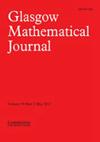由几乎收敛的二元展开序列定义的集合的Hausdorff维数
IF 0.4
4区 数学
Q3 MATHEMATICS
引用次数: 0
摘要
摘要本文研究了由几乎收敛的二元展开序列定义的集合的Hausdorff维数。更准确地说,对于[0,1]$中的任何$\alpha\,都可以确定以下集合\beggin{align*}\bigg{x\ in[0,1)\;:\;\frac{1}{n}\sum_{k=a}^{a+n-1}x_{k}\longrightarrow\alpha\textrm的Hausdorff维数。这就完成了Usachev[Glasg.Math.J.64(2022),691–697]考虑的一个问题,其中只给出了有理$\alpha$的维数。本文章由计算机程序翻译,如有差异,请以英文原文为准。
Hausdorff dimension of sets defined by almost convergent binary expansion sequences
Abstract In this paper, we study the Hausdorff dimension of sets defined by almost convergent binary expansion sequences. More precisely, the Hausdorff dimension of the following set
\begin{align*} \bigg\{x\in[0,1)\;:\;\frac{1}{n}\sum_{k=a}^{a+n-1}x_{k}\longrightarrow\alpha\textrm{ uniformly in }a\in\mathbb{N}\textrm{ as }n\rightarrow\infty\bigg\} \end{align*}
is determined for any
$ \alpha\in[0,1] $
. This completes a question considered by Usachev [Glasg. Math. J. 64 (2022), 691–697] where only the dimension for rational
$ \alpha $
is given.
求助全文
通过发布文献求助,成功后即可免费获取论文全文。
去求助
来源期刊
CiteScore
1.10
自引率
0.00%
发文量
36
审稿时长
6-12 weeks
期刊介绍:
Glasgow Mathematical Journal publishes original research papers in any branch of pure and applied mathematics. An international journal, its policy is to feature a wide variety of research areas, which in recent issues have included ring theory, group theory, functional analysis, combinatorics, differential equations, differential geometry, number theory, algebraic topology, and the application of such methods in applied mathematics.
The journal has a web-based submission system for articles. For details of how to to upload your paper see GMJ - Online Submission Guidelines or go directly to the submission site.

 求助内容:
求助内容: 应助结果提醒方式:
应助结果提醒方式:


